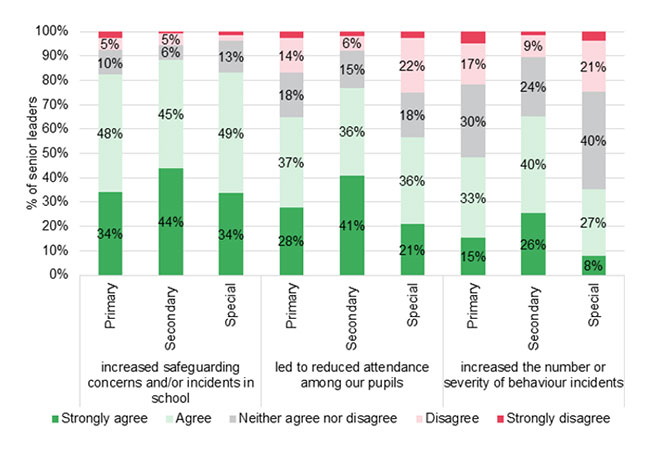Pupils at risk of profound impacts due to cost of living
Monday 2 October 2023

This article was first published in Children and Young People Now on Tuesday 26th September.
Pupils and their families have been profoundly impacted by the cost-of-living crisis, and schools are on the front line in responding to pupils’ needs.
Earlier this month, NFER published a series of reports [1] drawing on responses from over 2,500 senior leaders and teachers in mainstream and special schools to understand the impact of cost-of-living pressures on pupils and schools.
Our research highlights that without urgent action now, recent cost-of-living increases risk having far reaching and long-lasting impacts on pupils, particularly those who are most vulnerable, across both mainstream and special school settings.
Safeguarding concerns, behaviour incidents and absenteeism have been exacerbated by the cost-of-living crisis
The vast majority of senior leaders (at least 84 per cent across primary, secondary and special settings) report that cost-of-living pressures have increased both the numbers of pupils requiring additional support [2] and their level of need, especially in the most disadvantaged [3] schools.
School leaders report this led to an increase in the prevalence of safeguarding concerns, behaviour incidents and absenteeism in their schools, particularly in the most disadvantaged schools. For example, as shown in Figure 1, around 77 per cent of secondary, 65 per cent of primary and 57 per cent of special school leaders agree pupil attendance had reduced due to cost-of-living pressures.
This highlights that cost-of-living pressures have exacerbated challenges with reducing the level of persistent absence (where a pupil’s attendance is lower than 90 per cent of possible sessions) in schools – which significantly increased during the Covid-19 pandemic. For example, in autumn 2022/23, the persistent absence rate was 21 per cent in primary schools, up from nine per cent in 2018/19.
The extent senior leaders agree or disagree that increases in the cost of living have impacted on pupils over and above other factors (e.g., Covid-19 recovery)

Note: Due to rounding errors, figures may not match breakdowns presented elsewhere.
Source: NFER survey of 1441 senior leaders: the minimum number of responses given to an individual item was 1290
Cost-of-living pressures are also affecting schools’ core provision and compounding recruitment and retention challenges
Not only are schools having to meet increased levels of pupil need, but the increased cost of living, together with other challenges, has had a considerable negative impact on schools’ financial positions. Schools have had to make cuts to their provision (including staffing and learning resources) that staff feel are negatively affecting teaching and learning quality. Schools are only expecting the situation to worsen next year and for further cuts to be necessary.
Recruitment and retention challenges have also been exacerbated by recent cost-of-living increases as salaries in schools have not remained competitive and additional pressures have affected staff retention. This is amplifying the impacts of cuts and hindering schools’ ability to meet pupil need further.
Recommendations
Our findings paint a concerning picture of the profound impact that cost-of-living pressures are having on schools, and these pressures show no sign of abating in the immediate term.
Amongst other things, we are recommending that schools are given greater financial support in the short-term to address pressing well-being and welfare needs, alongside meeting the additional direct costs associated with the increased cost of living. Families should be provided with additional support, which might include revisiting current levels of welfare support available to families and/or additional cost-of-living payments.
Notes
[1] This study was conducted with ASK research and funded by the Nuffield Foundation.
[2] Additional support was defined as anything over and above the usual provision pupils might receive in relation to pupil premium and/or Special Educational Needs and Disabilities support.
[3] Based on the share of pupils eligible for free school meals in the school.
